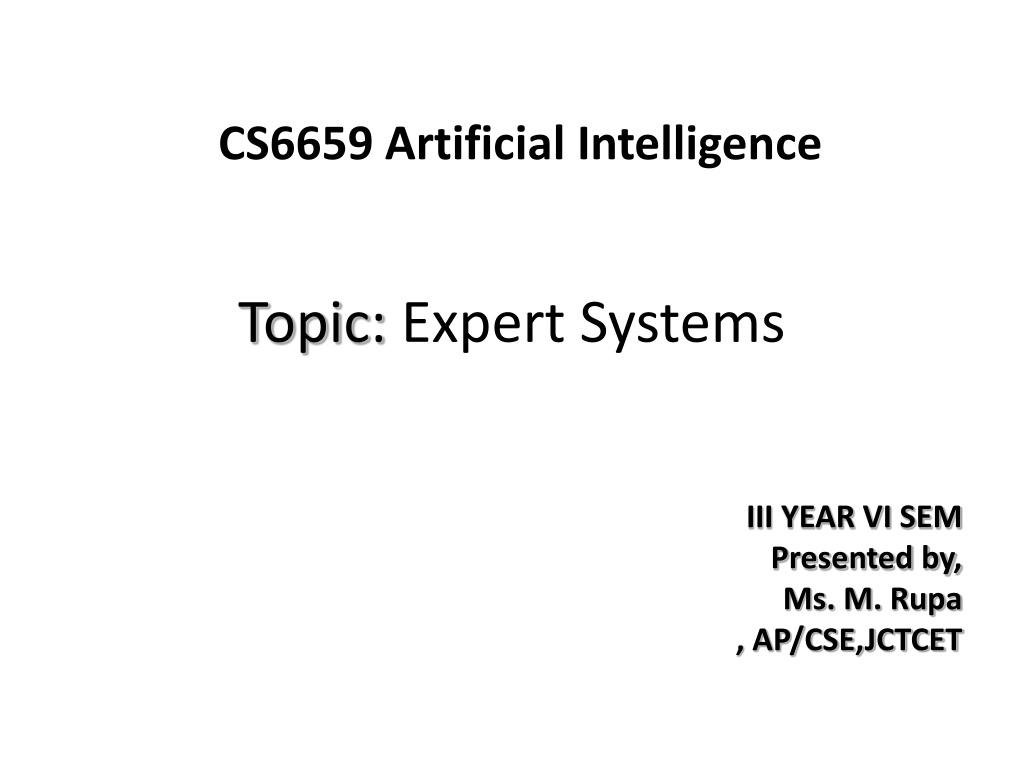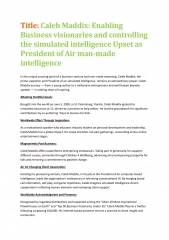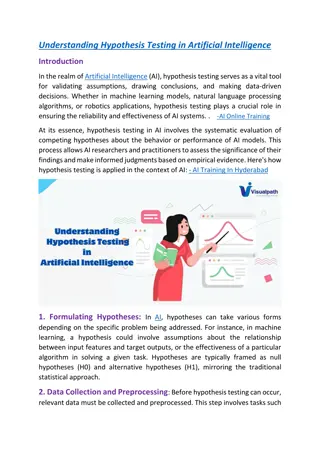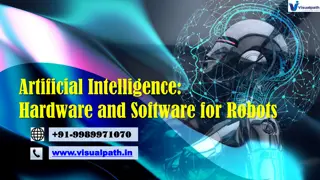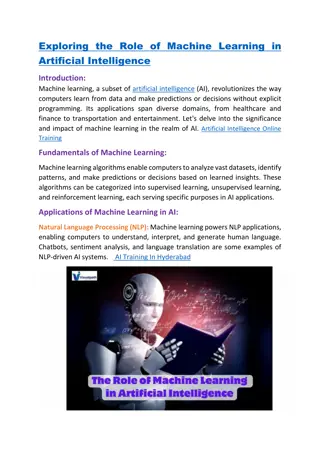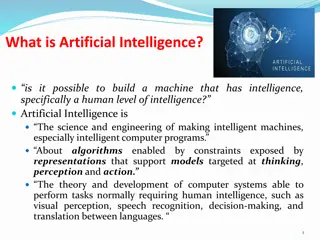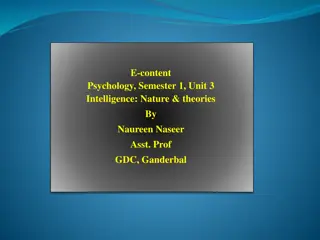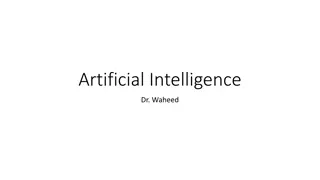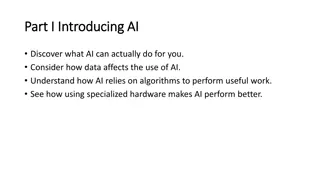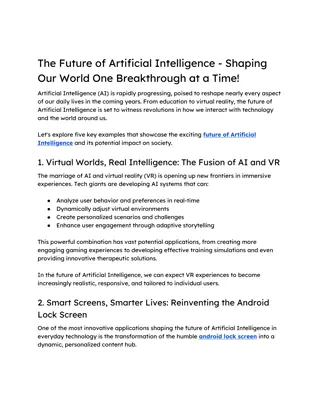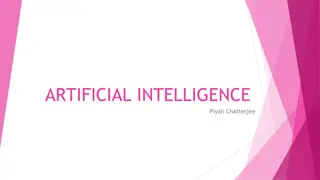Understanding Expert Systems in Artificial Intelligence
Expert systems in artificial intelligence are computer applications that utilize both facts and heuristics to solve complex decision-making problems based on knowledge acquired from experts. These systems play a crucial role in various domains such as diagnostics, chess playing, financial planning, and more. They consist of components like the user interface, inference engine, and knowledge base, with distinct roles for individuals interacting with the system. Expert systems harness computational power to handle vast amounts of knowledge efficiently, providing solutions that exceed human capabilities.
Download Presentation

Please find below an Image/Link to download the presentation.
The content on the website is provided AS IS for your information and personal use only. It may not be sold, licensed, or shared on other websites without obtaining consent from the author. Download presentation by click this link. If you encounter any issues during the download, it is possible that the publisher has removed the file from their server.
E N D
Presentation Transcript
CS6659 Artificial Intelligence Topic: Expert Systems III YEAR VI SEM Presented by, Ms. M. Rupa , AP/CSE,JCTCET
Motivation & Objectives Utilization of computers to deal with knowledge Quantity of knowledge increases rapidly Knowledge might get lost if not captures Computers have special requirements for dealing with knowledge Some knowledge related tasks can be solved better by computers than by humans
INTRODUCTION Expert systems are computer applications which embody some non-algorithmic expertise for solving certain types of problems. For example : Diagnostic applications Play chess Financial planning decisions Configure computers Monitor real time systems Underwrite insurance policies Perform many services which previously required human expertise.
What is Expert System ? An expert system, is an interactive computer- based decision tool that uses both facts and heuristics to solve difficult decision making problems, based on knowledge acquired from an expert. Inference engine + Knowledge = Expert system ( Algorithm + Data structures = Program in traditional computer ) First expert system, called DENDRAL, was developed in the early 65's at Stanford University.
Roles of Individuals who interact with the system Domain expert : The individuals who currently are experts in solving the problems; here the system is intended to solve. Knowledge engineer : The individual who encodes the expert's knowledge in a declarative form that can be used by the expert system. User : The individual who will be consulting with the system to get advice which would have been provided by the expert. System engineer : builds the user interface, designs the declarative format of the knowledge base, and implements the inference engine.
Three Major ES Components User Interface Inference Engine Knowledge Base
Components and Interfaces User interface : The code that controls the dialog between the user and the system. Inference engine : The code at the core of the system which derives recommendations from the knowledge base and problem specific data in working storage. Knowledge base : A declarative representation of the expertise often in IF THEN rules .
Expert System Benefits Benefits of Expert Systems Availability They are easily available due to mass production of software. Less Production Cost reasonable. This makes them affordable. Speed They offer great speed. They reduce the amount of work an individual puts in. Less Error Rate Error rate is low as compared to human errors. Reducing Risk They can work in the environment dangerous to humans. Steady response They work steadily without getting motional, tensed or fatigued. Production cost is
Expert System Limitations No technology can offer easy and complete solution. Large systems are costly, require significant development time, and computer resources. ESs have their limitations which includes Limitations of the technology Difficult knowledge acquisition ES are difficult to maintain High development costs
Knowledge Acquisition Knowledge acquisition is the process of extracting, structuring and organizing knowledge from one source, usually human experts, so it can be used in software such as an ES.
Typical expert systems MYCIN was an early backward chaining expert system that used artificial intelligence to identify bacteria causing severe infections. It is used in medical field.
DART DART: Expert systems for automated computer fault diagnosis. The Dynamic Analysis and Replanning Tool, explores the application of artificial intelligence techniques to the diagnosis of computer faults. It assists a technician in finding the faults in a computer system. (hardware and software). DART uses a device-independent language for describing devices and device-independent inference procedure for diagnosis. The primary goal of the DART Project is to develop programs that capture the special design knowledge and diagnostic abilities of these experts and to make them available to field engineers.
XCON XCON (eXpert CONfigure) is a type of computer program used by VAX ("virtual address extension") or (logical address) Computers for selecting various components based on customers requirements.
Expert System Shells Shells A shell is nothing but an expert system without knowledge base. A shell provides the developers with knowledge acquisition, inference engine, user interface, and explanation facility. A shell is a piece of software which contains the user interface, a format for declarative knowledge in the knowledge base, and an inference engine. Many expert systems are built with products called expert system shells. The knowledge and system engineers uses these shells in making expert systems.
Knowledge engineer : uses the shell to build a system for a particular problem domain. System engineer : builds the user interface, designs the declarative format of the knowledge base, and implements the inference engine. Depending on the size of the system, the knowledge engineer and the system engineer might be the same person.
Outcome of Human Expert Behaviors in ES Recognize and formulate the problem Solve problems quickly and properly Explain the solution Learn from experience Restructure knowledge Break rules Determine relevance Degrade gracefully
